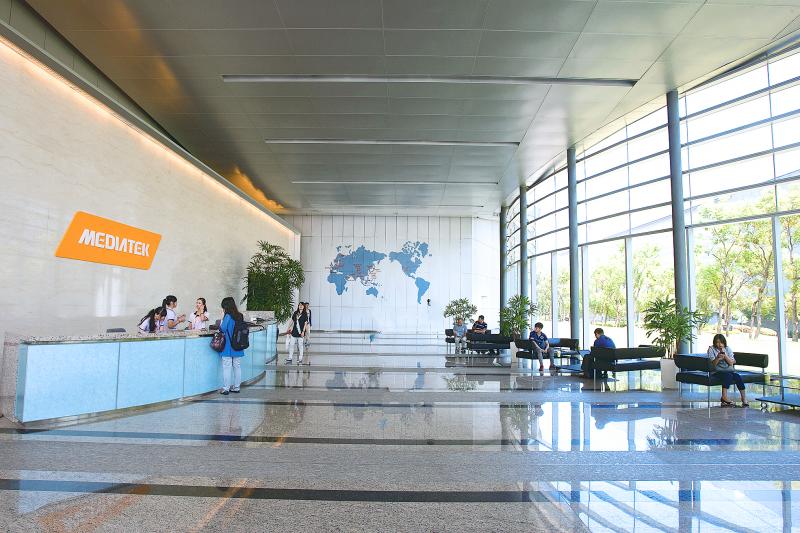MediaTek Inc (聯發科)aims to hire 2,000 workers by the end of this year to support its growth, tripling the number of positions it opened in the same period last year,the company said yesterday.
The world’s biggest designer of 5G smartphone chips had 17,377 employees as of the end of April.
“MediaTek seeks to widen its talent pool, as it is bullish about its business prospects,” the Hsinchu-based company said in a statement.

Photo courtesy of MediaTek Inc
It reported that revenue rose 82 percent in the first half of the year.
In July, it forecast that revenue for the whole of this year would increase 45 percent from last year amid improved uptake of 5G phones, while annual revenue would reach US$20 billion within two years, double last year’s figure.
To lure semiconductor talent, MediaTek said would offer annual salaries of NT$2 million (US$72,273) for new employees with bachelor’s degrees and NT$2.5 million for those with doctorates.
Based on statistics compiled by 104 Job Bank (104人力銀行), there are expected to be 28,000 job openings at local semiconductor firms this year, compared with 12,000 graduates with training in the semiconductor industry from Taiwanese institutions each year.
The job openings at MediaTek are mainly for chip developers at its premises in Taipei and Hsinchu.
The firm’s chips are used in smartphones, TVs, tablets, networking devices and Internet of Things devices.
The company this month arranged job fairs, as well as online and in-person interviews at 10 universities, including National Cheng Kung University, National Taiwan University and National Yang Ming Chiao Tung University.

Intel Corp chief executive officer Lip-Bu Tan (陳立武) is expected to meet with Taiwanese suppliers next month in conjunction with the opening of the Computex Taipei trade show, supply chain sources said on Monday. The visit, the first for Tan to Taiwan since assuming his new post last month, would be aimed at enhancing Intel’s ties with suppliers in Taiwan as he attempts to help turn around the struggling US chipmaker, the sources said. Tan is to hold a banquet to celebrate Intel’s 40-year presence in Taiwan before Computex opens on May 20 and invite dozens of Taiwanese suppliers to exchange views

Application-specific integrated circuit designer Faraday Technology Corp (智原) yesterday said that although revenue this quarter would decline 30 percent from last quarter, it retained its full-year forecast of revenue growth of 100 percent. The company attributed the quarterly drop to a slowdown in customers’ production of chips using Faraday’s advanced packaging technology. The company is still confident about its revenue growth this year, given its strong “design-win” — or the projects it won to help customers design their chips, Faraday president Steve Wang (王國雍) told an online earnings conference. “The design-win this year is better than we expected. We believe we will win

Chizuko Kimura has become the first female sushi chef in the world to win a Michelin star, fulfilling a promise she made to her dying husband to continue his legacy. The 54-year-old Japanese chef regained the Michelin star her late husband, Shunei Kimura, won three years ago for their Sushi Shunei restaurant in Paris. For Shunei Kimura, the star was a dream come true. However, the joy was short-lived. He died from cancer just three months later in June 2022. He was 65. The following year, the restaurant in the heart of Montmartre lost its star rating. Chizuko Kimura insisted that the new star is still down

While China’s leaders use their economic and political might to fight US President Donald Trump’s trade war “to the end,” its army of social media soldiers are embarking on a more humorous campaign online. Trump’s tariff blitz has seen Washington and Beijing impose eye-watering duties on imports from the other, fanning a standoff between the economic superpowers that has sparked global recession fears and sent markets into a tailspin. Trump says his policy is a response to years of being “ripped off” by other countries and aims to bring manufacturing to the US, forcing companies to employ US workers. However, China’s online warriors